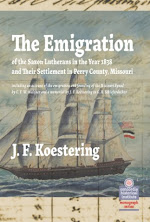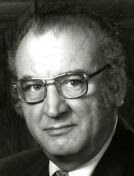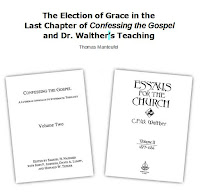This continues from
Part 2 (see also
Part 1) of my series exploring anew the original
Christliche Dogmatik of Franz Pieper.
- - - - - - - - - - - - - - - - -
I asked the question in
Part 1 "What good is this Index (of Eckhardt) in the German language for the English-speaking world when one can obtain the more extended Index in the
English Volume 4?"
Answer: Not a lot ...
except as I was preparing the text of Eckhardt's Index, by accident I ran across the subject of "Wucher" or
Usury. This surprised me as I had searched in vain for this subject in the English translations of
Christian Dogmatics... "Usury" was not to be found there. It also surprised me because I still consider the English translation to be quite reliable in its rendering of Pieper's original German text. – I have wondered at times why Pieper did not cover certain controversial issues in his
Christliche Dogmatik series, issues such as
Usury and
Life Insurance where old Missouri had published essays.
Especially the matter of Usury was of interest for me after reading an article by
Dr. Robert Kolb in the
Concordia Historical Institute Quarterly (
CHIQ), Winter 1975, pgs 127-139. The article was entitled “‘No Christian Would Dare Practice Usury’: A Walther Letter on Charging Interest”. In Kolb's essay, after giving much information on old Missouri's writings on Usury, he stated the following:
In the early twentieth century the synod’s theologians tacitly rejected the condemnation of usury voiced by its early leadership, and the Synodical stance was accommodated to the American way of doing business. – Robert Kolb (emphasis mine)
In the "early twentieth century"
the synod theologian was the President of Concordia Seminary, St. Louis –
Prof. Franz Pieper. Had Pieper "rejected the condemnation of usury voiced by its early leadership"? Hmmm... it seems Dr. Kolb (then the executive director of the
Center for Reformation Research, St. Louis) made quite a statement here... was it true?... did Pieper really reject Walther (and Luther) on Usury? ... Hmmmm... something did not seem quite right in Kolb's account in
CHIQ.
Now back to the topics I uncovered in the German version that were omitted in the English translation. The "Wucher" entry pointed to Volume 1, page 637 which begins the footnote # 1570, a very long footnote spanning 3 pages (to pg 639)... Here is a picture of the omitted German text ============>>>>>>>
Wow! It is omitted from Volume 1, page 533 of the English version at the very end of the section #3 – "How the Divine Law is Made Known to Man". It was quite surprising to me that this very large footnote would be entirely omitted... and it covered several other subjects besides "Usury" that were not mentioned in the English edition. Later posts will present these other uncovered topics...
Old Missouri's position on these matters are largely scoffed at today. But old Missouri was about following God's Word wherever it led, not about being popular. But I wonder that the original translators, Dr. Theodore Engelder, Prof. Walter Albrecht, and Dr. J. T. Mueller somehow felt these controversial topics could safely be dispensed with. Indeed Walther himself called these topics "secondary non-fundamental" articles, indicating the church did not "stand or fall" on them. But just as importantly,
neither were they indifferent matters which his opponents considered them to be, especially by the
Iowa Synod,
I want to present
Franz Pieper's definitive "early twentieth century" comment regarding
Usury:
Translation by BackToLuther. Highlighting is mine. Hyperlinks added for reference to sources. Texts in [] brackets are my additions.
= = = = = = = = = = = = = = = = =
3. Over Usury see the quotations with Baier-Walther III, 358-366. Furthermore: Theses on usury. With accompanying notes from Luther and other theologians writings. St. L. 1876 (Reprinted from L. u. W. 1866 pgs. 325 ff.). Report of the General Synod in 1869. Chemnitz deals very extensively with Usury in in his Loci, Ed. Wittenberg in 1623, II, 169 sqq, c. VI:.. De Usura [I believe this was omitted in J.A.O. Preus translation - section on "Poverty"]. This appropriate work of Chemnitz is very suitable, a lucid representation, and is communicated in a German translation in L.u W. 10, 171 ff. under the heading: "Martin Chemnitz on Usury". Also in the Lutheran Church of America detailed proceedings have been carried out over the "usury question" [Wucherfrage]. The understanding was made somewhat difficult by the complicated terminology sometimes used in different senses. One can read about this e.g. RE.2 XVII, 341 ff. under the title: "Usury, ecclesiastical laws regarding." [Wucher, kirchliche Gesetze darüber] We have formed the following opinion on the progress of the proceedings within the Lutheran Church in America: That the lending without "rent" or "interest" was to be done for the poor or to those who are in need, was admitted on all sides. A difference emerged in the question of how it is to be held in the lending to the non-poor for the purpose of doing business. This difference has different answers based solely on a single question. This question can be formulated by Luther’s procedure in the following way: Did the "hundreds" naturally "increase 5 [percent]" or not? With the answer “No” to this question, Luther judges accordingly, that the a priori determination is to be that "rent" or "interest" is rejected; one must wait and see if and how much "luck" (Luther's expression) have the hundred had during the year. With the answer “Yes” to this question – that the “hundred” have naturally increased five [percent] – consider it right that a priori five per cent or any particular amount may be required. This position is taken within the Lutheran Church in America, but at the same time explains in most cases that it is demanded by love that the stipulated "rent" or "interest" can not be claimed if the hundred has not actually brought the "five [percent]". They reveal their fundamental principle of a natural increase of five [percent] and position themselves in practice on Luther’s fundamental principle that the five [percent] does not naturally attach to the hundred. Why Luther's proposition was not approved by this side from the outset is still a logical and psychological mystery with us to this day. That Luther's statement is correct, each one can plainly be convinced of in this way, that he leaves a hundred for a year and checks on it after a year whether it has increased. It is also important to note that we did not require the Scriptures for the correct judgement of the usury question in the sense indicated, but only an average use of natural reason that man has remaining, even after the Fall, thank God. —
= = = = = = = = = = = = = = =
I took great care in translating this section of Pieper because I have had correspondence with some who have grappled with the question of Usury today, as even I do. And Franz Pieper gives the best "short answer" to be found for the Lutheran Church. Who cannot find in this subject reason to flee to the Saviour for forgiveness of his sins?
Now, where does this leave me with the comment by Dr. Robert Kolb above? Kolb said: "In the early twentieth century the synod’s theologians tacitly rejected the condemnation of usury voiced by its early leadership..."
But this isn't true. Why did Prof. Dr. Robert Kolb make this blatantly false statement? Perhaps others led him to this conclusion, others like
Carl S. Meyer, or someone else at
Concordia Historical Institute. But that is no reason to follow it. This was not the first time I have found essays in the
Concordia Historical Institute Quarterly that misrepresented old Missouri. In fact, in my early days of scouring everything I could find about and from "old Missouri", I gradually came to the conclusion that this journal was notorious for distorting the spiritual heritage of its "early leadership" and its theologians from the "early twentieth century". Indeed, I quit reading from
CHIQ many years ago because I wanted the true spiritual message, not just facts and earthly history.— Because of false statements like these, it is well to ignore the writings of Prof. Dr. Robert Kolb if one wants to get the true spiritual, Christian counsel. Rather one should read from Franz Pieper. Oh, but Franz Pieper
even mildly chastises his own Missouri when he says:
Why Luther's proposition was not approved by this side from the outset is still a logical and psychological mystery with us to this day. – Franz Pieper
... "a logical and psychological mystery"? Pieper uses two terms in his chastisement: (1) "
logical", or
natural human reason, and "
psychological", where Pieper's meaning is closer to a
spiritual understanding, not the worldly understanding of that term.
Indeed:
Luther • Chemnitz • Walther, and now Franz Pieper are the true teachers of the Biblical teaching on Usury... not today's LC-MS.
In the next
Part 4, I uncover Pieper's comments on "Life Insurance"... are you listening
Thrivent?


.jpg)




















